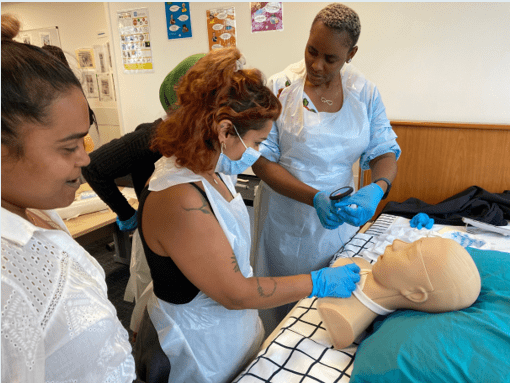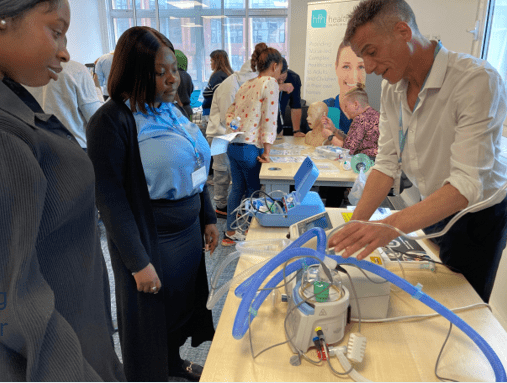A's Story
VENTILATION VIA TRACHEOSTOMY AT HOME – SAFELY STEPPING DOWN FROM NURSE DELIVERED TO NURSE DELEGATED CARE
A is a working academic who is in the later stages of Motor Neurone Disease (MND) and was hospitalised during the COVID 19 pandemic as her respiratory function had deteriorated and she required a tracheostomy with full ventilation.

A was eager to return home when medically fit for discharge but was highly apprehensive, as she now required 24-hour care and support. During her prolonged period of hospital admission, she was comfortable with her care being provided exclusively by nurses. Although safe and appropriate, A was extremely anxious about a transition to a nurse delegated, carer delivered package of care.
A’s health needs included: Tracheostomy Care, Ventilation, Cough assist via tracheostomy, oral suctioning, and Enteral Feeding via gastrostomy. A has capacity and wanted to direct her own care in her family home. A communicates using Eye Gaze. Her goals were to get back to work and home to her partner.
The HFH Onboarding Team and her assigned Nurse Case Manager (NCM) focused on building trust by addressing the understandable anxieties. This was achieved through identifying methods for clear communication and education with A and her family, taking time to explain the key steps that we would take together to achieve a safe discharge.

The HFH Onboarding Team worked closely with the multi-disciplinary team around A, to develop a holistic and comprehensive care plan which included realistic goals and personalised outcomes. We required a highly skilled team that were familiar with her routine and were able to anticipate her needs, so that A was empowered to return to work and family life.
Orientation shifts in hospital for her new care team, alongside our experienced NCM were crucial to A and family becoming familiar with the specialist trained care team and confident about their competence to support her individual health needs.
Having successfully received care from our specialist carers at home for over a year now, A feels comfortable, reassured, and supported by them. This in turn has meant she has been able to maintain a husband-wife relationship with her partner, as opposed to a patient-carer relationship. A is also happy to have been able to maintain her role as an Aunty to her nieces, who are once again able to visit her at home. She can also continue to focus on her work rather than her care, which has led to further publications within her field.





